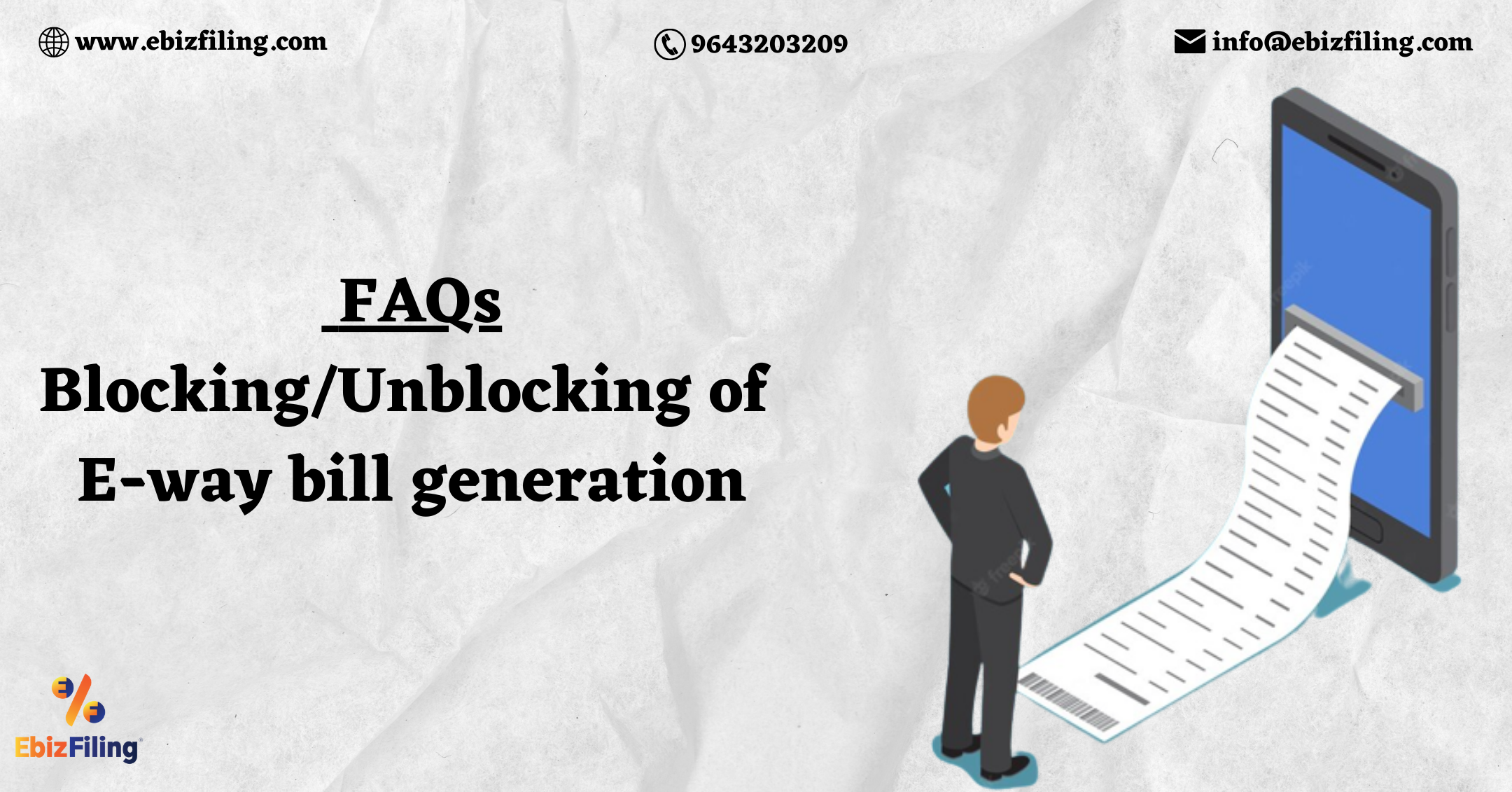
-
March 15, 2023
FAQs on unblocking and blocking of E-way bill generation
Introduction
In India, the E-way bill refers to the Electronic-way bill. It is a critical document that enables the movement of goods from one place to another. The Electronic-way bill is an electronic document generated online through the GST portal. It contains details such as the name of the consignee and consigner, the goods’ value, and the vehicle number used to transport the goods. The Electronic-way bill is essential for goods that are valued at more than Rs. 50,000. In this article, we will discuss the frequently asked questions about unblocking and blocking E-way bill generation.
FAQs on E-way bill generation
Q1. What is an E-way bill?
An Electronic-way bill is an electronic document that contains details of the goods being transported. It is mandatory for the transportation of goods worth more than Rs. 50,000 in India. The Electronic-way bill can be generated online through the government portal or mobile app.
Q2. Who is required to generate an Electronic-way bill?
The Electronic-way bill can be generated by the supplier or the recipient of the goods, or the transporter. It is mandatory for all inter-state transportation of goods worth more than Rs. 50,000.
Q3. What is the meaning of the blocking of E-way bill generation?
The blocking of Electronic-way bill generation refers to the restriction on generating E-way bills due to non-compliance or violation of the Electronic-way bill rules. When the Electronic bill generation is blocked, the taxpayer cannot generate or update the E-way bill until the issue is resolved.
Q4. What are the reasons for blocking the E-way bill generation?
The E-way bill generation can be blocked due to various reasons, such as non-filing of returns, non-payment of taxes, non-compliance with the E-way bill rules, mismatch in the information provided in the E-way bill, or any other violation of the E-way bill rules.
Q5. How can the E-way bill generation be unblocked?
The E-way bill generation can be unblocked by addressing the issue that led to the blocking of the Electronic-way bill. For instance, if the generation of Electronic-way bill was blocked due to the non-filing of returns, the taxpayer can unblock the Electronic-way bill by filing the returns and paying the due taxes. Similarly, if the generation of an E-way bill was blocked due to a mismatch in the information provided in the E-way bill, the taxpayer can unblock the Electronic-way bill by correcting the information and updating the Electronic-way bill.
Q6. What is the process for unblocking the E-way bill generation?
The process for unblocking the Electronic-way bill generation varies depending on the reason for the blocking of the Electronic-way bill. Generally, the taxpayer needs to identify the reason for the blocking of the Electronic-way bill and take the necessary steps to address the issue. The taxpayer can then approach the concerned authority, such as the GST officer, to request the unblocking of the generation of Electronic-way bill.
Q7. Who is the GST officer?
The GST officer is a designated officer who is responsible for the implementation and enforcement of the GST laws in India. The GST officer is authorized to conduct audits, inspections, and investigations to ensure compliance with the GST laws.
Q8. What is the role of the GST officer in unblocking the E-way bill generation?
The GST officer plays a crucial role in unblocking the Electronic-way bill generation. The taxpayer can approach the GST officer to request the unblocking of the E-way bill generation. The GST officer will review the request and verify the compliance status of the taxpayer. If the GST officer is satisfied with the compliance status, they will unblock the generation of Electronic-way bill.
Q9. What is compliance in the context of the E-way bill?
Compliance in the context of the Electronic-way bill refers to adherence to the rules and regulations governing the generation of Electronic-way bills. The compliance requirements include timely filing of returns, payment of taxes, and accurate information in the E-way bill.
Q10. Why is compliance important for E-way bill generation?
Compliance is crucial for E-way bill generation as non-compliance can lead to the blocking of Electronic-way bill generation. This can result in delays in the transportation of goods and affect business operations. Compliance also ensures that the E-way bill system functions effectively and achieves its objectives of tracking the movement of goods and preventing tax evasion.
Conclusion
The Electronic-way bill system has streamlined the transportation of goods in India and has brought transparency to the movement of goods across state borders. However, there are instances when E-way bill generation is blocked, leading to delays in the transportation of goods. It is essential for taxpayers to comply with the Electronic-way bill rules to avoid blocking the generation of Electronic-way bills. In case of blocking, the taxpayer can unblock the Electronic-way bill generation by addressing the compliance issues and approaching the concerned authority, such as the GST officer. By ensuring compliance with the E-way bill rules, taxpayers can avoid disruptions in the transportation of goods and contribute to the smooth functioning of the Electronic-way bill system.
Get Online GST Registration
Make your business GST Compliant. Never lose on GST input credit ever. Obtain your GST Registration Online at INR 1999/- only.
About Ebizfiling -










Reviews
Dhairya Lalan
23 Apr 2022Amazing team. They had a word with me post working hours and solved all my queries related to tax consultancy. I highly recommend the services.
B David
09 Apr 2022I am a Sports Journalist from Bengaluru and a bit illiterate when it comes to doing business. But I did venture out and started a startup Alpharemy LIfestyles LLP and ran to auditers, lawyers and other experts for five years but could not close my LLP and paid huge amuunts for Compliance. Finally, I searched online and went to Ebizfiling. Initially, I was skeptical if the things will be completed on time, because the rates were almost 50 per cent less than what they asked in Bengaluru. Also I spoke to someone at the other end and I did not understand certain things. But after Deepak Sharma took over, the process was so smooth. He got the DSC done in minutes and he sent all the drafts requred to file Form 24. And I signed and sent them back with notary signatures and then he patiently cleared all my doubts on incorporation, and other compliance issues. Initially, I wanted to take an IEC for exporting hair and lifestyle products like wigs for cancer patients, he explained all about the process to get IEC. On top of it, he kept the deadline as today is the last date for filing LLP returns, Form 8 KYC and what not... All the headaches are solved and am peaceful, thanks to Deepak. Thank you sir. Much appreciated!
Chander Verma
01 Oct 2019Ebiz Filling team did all filling conveniently, team is flexible, approachable. I highly recommend EbizFilling to startups like for all financial services.
January 2, 2026 By Dhruvi D
Why TRPs should collaborate with ROC & legal experts? It Often Starts With a Filing That Doesn’t Feel Right Most Tax Return Preparers and GST Practitioners begin their day with numbers. Returns, reconciliations, GST filings, income details. That is the […]
January 1, 2026 By Dhruvi D
Skills GST practitioners should upgrade to in 2026 To begin, For a long time, being good with GST meant knowing returns, rates, and deadlines. If filings were accurate and timely, clients were satisfied. That definition is changing. In […]
January 1, 2026 By Dhruvi D
Best compliance add-ons for GST practitioners this Year It Usually Starts When GST Work Becomes Too Much to Handle Alone Most GST practitioners start their practice with a clear focus. File returns correctly. Meet deadlines. Handle notices when they come. […]